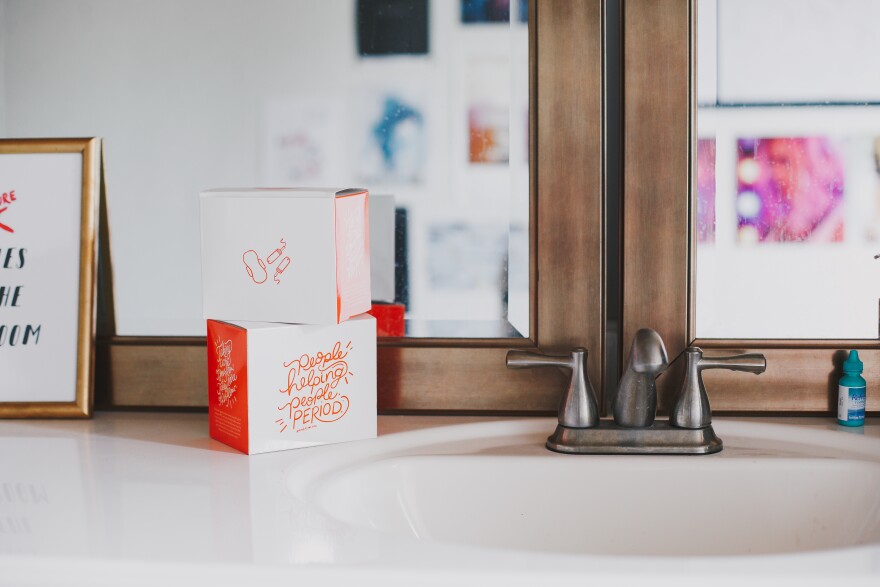Boxes of tampons line the wall of a small warehouse in west Columbus. T-shirts read, “People helping people, period.” And buttons with cartoons of ovaries have slogans like “ova achiever” and “caution: I ovary-react.”
This is the workspace of Claire Coder, a 20-year-old entrepreneur who started the business with the mission to make sure all people have access to tampons.
"We have at least 100,000 tampons and pads in stock right now, and this is the low point," Coder says. "We’re receiving another half a million in the next two weeks, and then after that we’re receiving a million pieces, so in about three weeks this area is about to be filled with tampons."
Where do these millions of tampons go? Coder says they want to put the products where women need them.
"The first portion is for businesses, so businesses can purchase our 100 percent organic cotton tampons, and offer them for free in their bathrooms," Coder says. "And that really just promotes equality, supporting employees, and making sure that people have access to the products that they need. And of course if toilet paper is free, why aren’t tampons?"
The rest of the tampons are meant for individual customers, who can purchase a personalized box of tampons every month.
For every box a consumer buys, another box is donated to select organizations in Columbus and across the country such as the Mid-Ohio Foodbank - sort of like Tom’s Shoes, but for menstrual products.
"People don’t know that tampons and pads aren’t covered by food stamps, they’re not covered by WIC (Women, Infants and Children). They’re taxed in Ohio, they’re taxed in states across the country," Coder says. "So people living in the United States that are below the poverty line… I mean, tampons are expensive!"

She says some of the people she’s spoken to have resorted to using plastic bags and dirty socks in place of tampons or pads.
"The problem is though, just because you don’t have a tampon doesn’t mean the flow isn’t there," Coder says.
Coder says her growing business is helping more people, but it took a lot of work to get here. She came up with the idea for Aunt Flow at a start-up weekend in 2015, when her period began out of the blue.
"I was like, oh my gosh, this is a 72-hour hackathon, what am I going to do? There’s predominantly men," Coder recalls. "I felt uncomfortable asking for a tampon."
So she pitched an idea for a business that would provide tampons to people in need.
At the time, Coder was a freshman at Ohio State. Since then, she dropped out of college, completed a , hired her first full-time employee, and even made her debut on reality TV - the show on TLC.
"There were eight girls. We were all competing for $100,000 to demonstrate that we were entrepreneurial and that girls can do things and that women can change the world," Coder says. "So that experience was wild."
Coder says she worked with executives from Vera Bradley and Microsoft, learning business tips from experts. She says that knowledge became useful when Aunt Flow was struggling to gain customers.

"Three months ago, I was sitting here, thinking, oh my gosh, this company is going to go under, and this was just three months after we launched," Coder says.
But she stayed the course and says now, business is better. Coder says the stress of those hard times is worth it.
"Being part of a company that really changes lives, it’s really exciting every small win that we have," Coder says. "Every small win adds up to a larger win. Every time we get new product, we know that we can give more product. Every time we get a new order, we know that we can do more. Every time we get a new warehouse or grow a little bit more, we know that our impact is larger."
One day, Coder says she hopes free tampons will be available in every public bathroom and that every menstruating person will have access to tampons.
For now, though, she says she’s working toward that future “one cycle at a time.”





